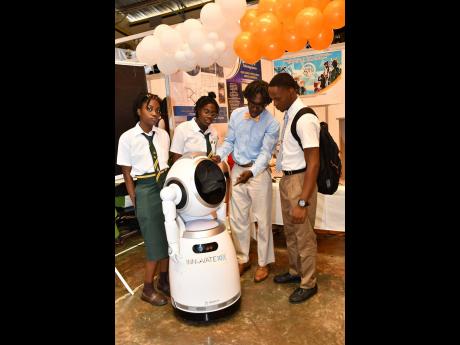Crawford says concerns over CXC’s suspension of vocational subjects misplaced
UTech to revise matriculation requirements in light of changing landscape
Damion Crawford, the opposition spokesman on education, has labelled as “exaggerated and misplaced” the concerns raised over the suspension of four vocational subjects by the Caribbean Examinations Council (CXC).
Last week, the regional body said it would be discontinuing the certification of mechanical engineering at the Caribbean Secondary Education Certificate (CSEC) level, and green engineering, electrical and electronic engineering and technology, and agricultural science – double award at the Caribbean Advanced Proficiency (CAPE) level because of low enrolment.
But noting that the decision was as a result of a survey conducted with regional education ministries last year, the CXC said territories across the Caribbean may choose to maintain the subjects under certain conditions.
The suspension of the subjects is to take effect September 2026.
However, while advising the Ministry of Education to use the time period to assess the courses it will continue to offer, and thus paying for their development and marking, Crawford asserts that the “real problem lies with encouraging persons to take on these subjects, or encouraging teachers that can teach these subjects to remain”.
“As it is, [what] we are facing, for example, with mechanical engineering is that there is a vast shortage of teachers, therefore not allowing many students to be trained in the area, thus taking the subjects. So that would be more of a Ministry of Education issue to identify the priority, to ensure that the teachers are available, and to ensure that the laboratories for these activities are also available,” he said.
Crawford said that unless these issues are corrected, the enrolment numbers will continue to be low, even if the ministry uses another agency for certification.
“If the students are not there to take up the subject, then no entity will offer it,” he said. “City & Guilds will only offer subjects that it has a certain quantity of students to make the subject a viable offer, to design the exams and to mark the exams.”
Crawford suggested the reallocation of $5 billion from the HEART/NSTA Trust fund to be spent within the next three years to upgrade school laboratories.
Further, he said that the refurbishing of these laboratories across schools would provide an opportunity to create clusters of technical and vocational education and training (TVET) workrooms, with institutions offering different subjects.
“We have made a call about five years ago that $5 billion each year should be reserved so that we can do 50 schools to build laboratories, the necessary electrical equipment, the necessary woodwork equipment, the necessary plumping equipment within the schools, the necessary clothing and textile, the necessary construction management,” he said.
Denworth Finnikin, a lecturer and former national TVET director at the Ministry of Education, also believes more can be done to increase students’ uptake of these subject areas. A good start, he argued, is a public education campaign to remove the stigma around them.
“We have to educate the country because coming out of the post-colonial era, there are many parents who just want their children to be doctor, lawyer … and not recognising that there is a broad spectrum of careers out there in the technical and vocational areas,” he said.
Finnikin argued that this “backward” mindset is evident among the leadership CXC, whose decision, he argued, is not in support of the region’s growth.
Meanwhile, Dr Damian Graham, programme director and lecturer in the Industrial and Mechanical Engineering Department in the Faculty of Engineering and Computing at The University of Technology, Jamaica, said the decision by CXC may result in the faculty changing its entry requirements.
Currently, students who matriculate from high school into the faculty to pursue a diploma require five CSEC subjects, including mathematics, physics and one other science subject in addition to the subject area they will be majoring in.
Students pursuing a degree will need six units of CAPE, in addition to the five CSEC subjects.
He noted that current entry requirements do not accommodate City & Guilds level two and three certifications.
Last year, the Government put in place a memorandum of understanding with City & Guilds to have level three postnominal certification in mechanical and electrical engineering.
Because of this, Graham said that UTech will be revisiting entry requirements to take into consideration “the landscape” that currently exists and be aligned with government policy.
“The countries that do really well have anything in the region of about two to three per cent of their overall labour force being engineers. Jamaica has about 3,000 engineers; we need to have about 8,000 engineers,” he said.


